Question:
How do leading causes of death in 2020 compare to their popularity in terms of Google searches across Canada, the US and the UK?
Answer:
Overall, our search trends in 2020 did not reflect what we actually died from.
The charts below shows the relative frequency of top causes of death in the UK, US and Canada (right y-axis) compared to the relative frequency of googled related terms (left y-axis). Hashed blue bars show the relative frequency of googled related terms in French in Canada. Leading causes of death are shown on the x-axis and are ordered from most to least prevalent (in terms of proportion of total deaths in Canada). Even without the impact of COVID-19, there is a clear disconnect in this comparison.
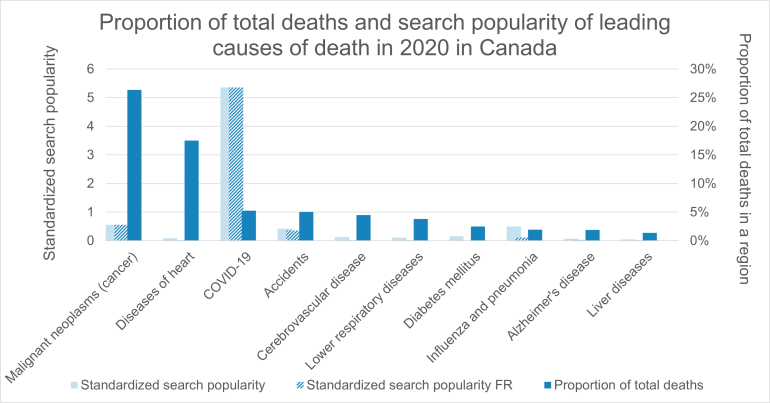
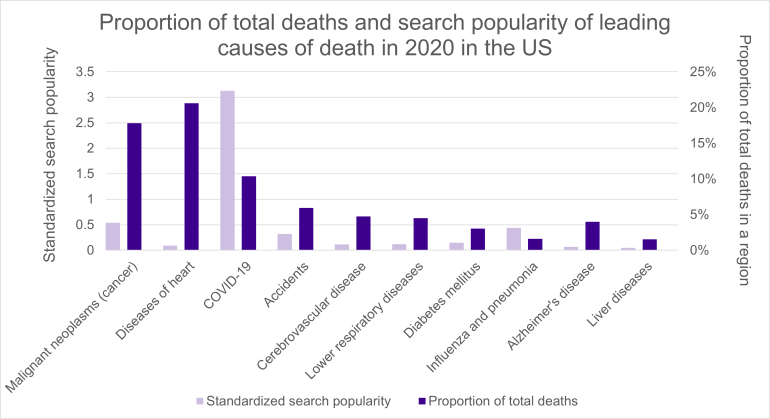
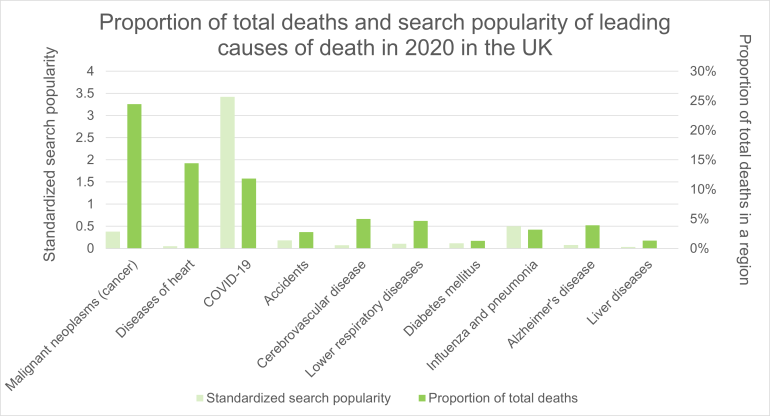
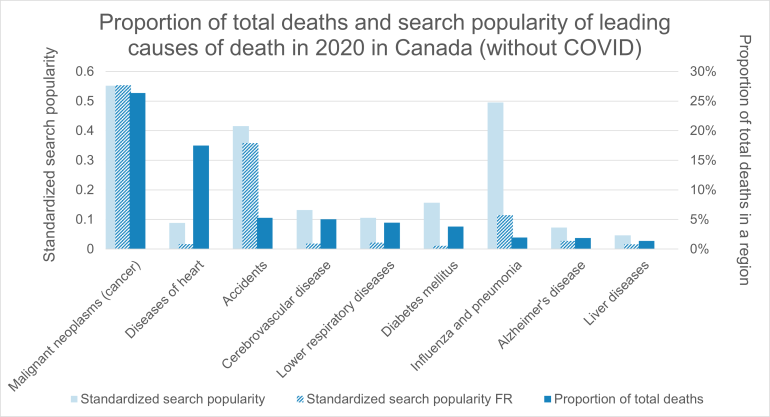
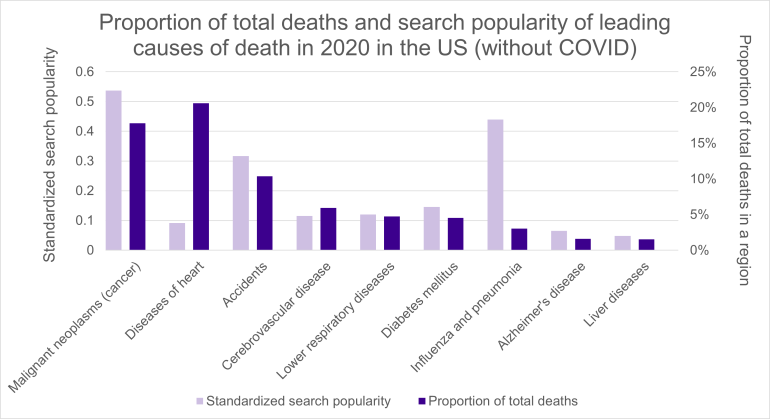
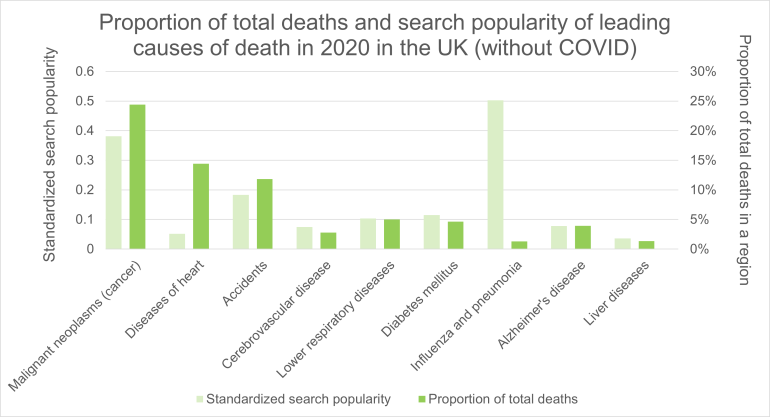
Note: It is common in UK reporting, but not in US or Canada, to include dementia deaths (causes F01 and F03) together with Alzheimer’s disease deaths (cause G30). The numbers illustrated here are only in relation to Alzheimer’s disease to allow for international comparison.
In 2020, COVID-19 dominated search terms –in fact, “coronavirus” was the most popular search in the world that year (Google's Year in Search - Google Trends). This is not surprising, of course, as it is a novel virus and resulted in a global pandemic.
Besides the obvious boom in interest in COVID-19, the biggest difference between a leading cause of death and its search popularity was that for “diseases of the heart” which consistently ranked among the top 3 leading causes of death across all 3 regions but was among the lowest popular searches. Any discrepancies between search popularity and leading causes of death were amplified when querying French terms in Canada (especially since the more popular terms such as “coronavirus” and “cancer” are the same in both English and French).
Interestingly, cancers (malignant neoplasms), despite being second to diseases of the heart in leading causes of death in the United States, were much more popular in searches than diseases of the heart. (This was also true for Canada and the United Kingdom, where malignant neoplasms are the top cause of death.) There are many reasons why the relative frequency of a search term might increase, but this could be a partial indication that we are more concerned with certain causes of death than others.
Of the other causes of death, we note in particular that Alzheimer’s disease has been increasing as a leading cause of mortality across the 3 regions, yet its search popularity was relatively low. In fact, one report (News | Alzheimer's Association) found that in the US, the rate of deaths due to Alzheimer’s had risen by 123 percent between 2000 and 2015. In contrast, the rate of deaths due to diseases of the heart (the top cause of death in the US and Scotland, and the second in Canada in 2020) had decreased by 11 percent in this same period. It is somewhat surprising that both Alzheimer’s disease and diseases of the heart ranked relatively low across all regions (CA, US, UK) in terms of search popularity. The rise in Alzheimer’s disease and dementia is an area that the Club Vita team has a special interest, for more on this topic see Douglas’s recent blog
The key questions are:
- What drives the discrepancies between what we search for and what we die from?
- Are these discrepancies a reflection of a failure in public health messaging? And what can we do to redress the balance?
- Are the causes of death with low search rates an indication of blind spots for health behaviours? Could they be an indication of future problems being added to the longevity pipeline?
What do you think?
Sources for leading causes of death in each region:
- Canada: Leading causes of death, total population, by age group (statcan.gc.ca)
- USA: NCHS Data Brief, Number 427, December 2021 (cdc.gov)
- Data for chronic liver disease deaths in 2020: How Many People Have Liver Disease? - American Liver Foundation
- UK:
- England and Wales - Deaths registered in England and Wales - Office for National Statistics (ons.gov.uk)
- Deaths registered in England and Wales - Office for National Statistics (ons.gov.uk)
- Scotland - Most frequent causes - ScotPHO,
- Northern Ireland - Registrar General Annual Report 2020 Cause of Death | Northern Ireland Statistics and Research Agency (nisra.gov.uk), Section 6 - Cause_Death_Tables_2020_Revised June 2022.xlsx (live.com)
We used Google Trends to capture the relative interest in different search terms relating to the 10 leading causes of death in all 3 regions.
FAQ about Google Trends data - Trends Help
The causes of death with ICD-10 codings as well as the queried terms for each cause of death are as follows:
Leading cause of death [ICD10 codes] |
Causes de décès principales [codes CIM10] |
Search terms in Google trends query (based on language used in ICD10 codings) |
Termes de recherche dans les interrogations de Google trends –Français, Canada- (basés sur le langage utilisé dans les codes de la CIM10) |
Malignant neoplasms [C00-C97] |
Tumeurs malignes [C00-C97] |
Cancer, malignancy |
Cancer, malignité |
Diseases of heart [I00-I09, I11, I13, I20-I51] |
Maladies du cœur [I00-I09, I11, I13, I20-I51] |
Heart disease, heart attack, angina, cardiomyopathy |
Maladie cardiaque, crise cardiaque, angine de poitrine, cardiomyopathie |
COVID-19 [U07.1, U07.2] |
COVID-19 [U07.1, U07.2] |
COVID, COVID-19, coronavirus |
COVID, COVID-19, coronavirus |
Accidents (unintentional injuries) [V01-X59, Y85-Y86] |
Traumatismes non intentionnels [V01-X59, Y85-Y86] |
Accident, accidental death, drown, car accident, accidental shooting |
Accident, mort accidentelle, noyade, accident de voiture, tir accidentel |
Cerebrovascular diseases [I60-I69] |
Maladies cérébrovasculaires [I60-I69] |
Cerebrovascular disease, stroke, haemorrhage |
Maladie cérébrovasculaire, AVC, hémorragie |
Chronic lower respiratory diseases [J40-J47] |
Maladies chroniques des voies respiratoires inférieures [J40-J47] |
Lower respiratory disease, bronchitis, emphysema, COPD, asthma |
Maladie des voies respiratoires inférieures, bronchite, emphysème, BPCO, asthme |
Diabetes mellitus [E10-E14] |
Diabète sucré [E10-E14] |
Diabetes |
Diabète |
Influenza and pneumonia [J09-J18] |
Grippe et pneumonie [J09-J18] |
Influenza, pneumonia, flu |
Influenza, pneumonie, grippe |
Alzheimer's disease [G30] |
Maladie d'Alzheimer [G30] |
Alzheimer’s, Alzheimer disease, dementia |
Alzheimer, maladie d'Alzheimer, démence |
Chronic liver disease and cirrhosis [K70, K73-K74] |
Maladie hépatique chronique [K70, K73-K74] |
Liver disease, alcoholic liver disease, cirrhosis, fibrosis |
Maladie du foie, maladie alcoolique du foie, cirrhose, fibrose |




